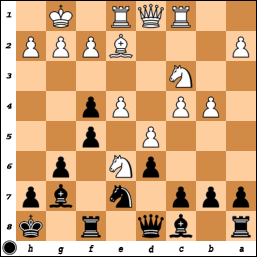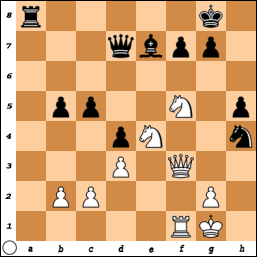Basically, I found a specific opening variation I have been studying and searched my database for it. After putting in specific variables - I wanted to study how masters carried out their plans against lower rated competition - I came up with 22 games. I played through the games fairly quickly, about 2 minutes per game.
The first few games kinda flew by, but then I noticed something interesting. I saw several positions like the one below:

Here, White had just moved his knight to e6. In several of my own games, I always wondered whether I should prevent this and if not how I should handle the annoying pawn on e6 after capturing with the bishop.
After playing through 5-6 games with this, I started to get a feel for what Black could do in this situation. Nothing too general, as each position was slightly different (that was a lesson in itself), but realized that it was something that shouldn't be feared. Now perhaps studying a few more games like this more in detail will help strengthen this knowledge, but getting an overall view through seeing it in several games was very helpful.
By the way, this concept of playing through master games quickly and in high volume is not a new one. Jeremy Silman, Dan Heisman, and Ken Smith mention it as an effective training method. It may seem a little passive for some, but I think it has some benefits:
1. By doing it quickly and in fairly high volume, I think your mind makes connections between common themes and patterns. for example, if the same 5-6 games were studied weeks apart, the connections might be more difficult to make without specifically looking for it.
2. It is a great exercise for when you're too tired to do intense training. Attention is still needed, but it's a little lighter than playing a serious game, or playing through a deeply annotated master game. For example, I decided to do this tonight because I was too tired to study and felt it would be more productive than playing some relaxing blitz chess (I think I was right).
3. It is easy with access to online databases (I used chesstempo.com) and the ability to filter games according to position, material, player ratings, and results allows you to customize this exercise to your specific needs.
In any case, I do have a few opinions on how to best do this:
1. I would suggest you pick a specific theme for the games you will study. For example, games within a specific opening variation.
2. I think at least one player be a strong player. For example, as I play the King's Indian Defense as black, I made sure all of the players with the black pieces have a rating of at least 2400 (I went higher, but I couldn't find enough games so I lowered it to 2400). As I mentioned, I think your subconscious mind picks up things you may not be aware of, so I would rather pick up the types of moves a 2400+ player would make than say, the moves an 1800 player would make.
3. Although this is a little more relaxing, it is important to pay attention to the board and not have too many distractions while doing it.
Of course, feel free to experiment with different variables. Let me know how it goes if you choose to try this out or if you already do this.
